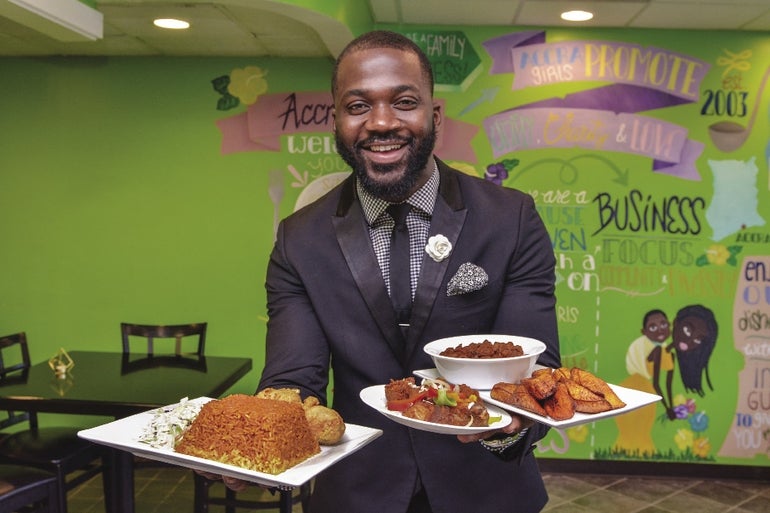City of Immigrants: Foreign-born residents have unusually large impact on Worcester's economy
Emmanuel Larbi was 7 years old when his family immigrated from Ghana to Worcester in 2002, leaving behind a country with too few opportunities for families to live comfortable lives.
Sixteen years later, Larbi works as a cancer researcher at Tufts Medical Center in Boston and co-owns the restaurant Accra Girls on Grafton Street in Worcester with his mother, Sarah Larbi. The restaurant is only a year old – spun off from a catering business Sarah Larbi and her sister founded in 2003 – but Emmanuel is already thinking big, hoping to one day make the brand as iconic as Ford or General Electric.
“If it doesn't seem impossible, I think you're not dreaming big enough,” Larbi said one crisp day in October, right before the start of his night shift at Accra Girls but still dressed in the suit and tie he wears for his research job.
Larbi and his mother are among the nearly 40,000 Worcester foreign-born residents who have made a disproportionately large impact on the economy of the city, whose immigrant population has been higher than the state and national averages since its incorporation in 1870.
“A trip through many of the city's neighborhood retail districts or the halls of its larger businesses will illustrate the influence of foreign-born leaders and employees,” said Timothy McGourthy, the executive director of the Worcester Regional Research Bureau. “Add the spending power of these individuals and households, and an important underpinning of the economy is rooted in the presence of the foreign-born.”
To better understand the city's immigrant community, Worcester Business Journal partnered with the Worcester Regional Research Bureau at the start of 2018 to study the historic and current impact of foreign-born residents on the economy. The results show immigrants in the city are more likely than native citizens to be entrepreneurs and have bachelor's degrees, and foreign-born business owners comprise more than two-thirds of the city's locally owned restaurants and landscaping companies.
“Moving here was one of the biggest challenges of my life,” said Oriola Koci, who moved to Worcester from Albania in 1996 when she was 19 years old and now co-owns two Worcester restaurants with her husband Enton Mehillaj, also a native of Albania. “If you come here, you know nothing's given to you. You have to have the work ethic in order to survive.”
Entrepreneurial spirit
Foreign-born residents make up 22 percent of Worcester's population yet comprise 36 percent of business owners, according to the WRRB report, citing U.S. Census Bureau data. About 2.6 percent of Worcester immigrants work in their own business, compared to 1.7 percent of the native-born population.
“I didn't want to come all the way to America to be a waitress,” said Joan Culbert, a native of Ireland who owns Emerald Meats on Chandler Street with her husband, Robert. With how difficult emotionally it was to leave Ireland, “we didn't want to live an ordinary life after that.”
Foreign-born residents like Culbert, Koci and Larbi all echoed the same sentiment about immigrant entrepreneurs: They have already taken such a big leap just to be here. They uprooted their lives in their home countries to take a chance a life in America would give them the economic prosperity not available in their native lands.
Foreign-born residents like Culbert, Koci and Larbi all echoed the same sentiment about immigrant entrepreneurs: They have already taken such a big leap just to be here. They uprooted their lives in their home countries to take a chance a life in America would give them the economic prosperity not available in their native lands.
In a 2015 report, Worcester nonprofit Seven Hills Foundation found foreign-born residents made up 18 percent of Massachusetts business owners versus 37 percent of Worcester business owners.
The report affirms immigrants' ongoing role in the Worcester economy, which has been a factor for as long as foreigners have settled in the city, said Seven Hills president David Jordan.
“That phenomenon has been true for 150 years,” Jordan said.
In 1870 when Worcester was founded, 29 percent of its 40,000 residents were foreign born, higher than the state and national averages of 24 percent and 14 percent, according to WRRB.
The percentage of the foreign-born population has varied in the decades since but always outpaced the national average: Between 1870 and 1910, more than 25 percent of Worcester residents were immigrants (versus 15 percent nationally), but that number steadily dropped until hitting 10 percent in 1990 (versus 8 percent nationally) before rebounding to 22 percent (versus 14 nationally) today.
If the American dream is for anyone to have an opportunity to live a comfortable life for themselves, Jordan said, the biggest dream someone might have is to come to America and open up a business.
“That's what they dream of,” Jordan said.
Immigrant businesses
The majority of immigrant entrepreneurs gravitate toward two industries: restaurants and other food service, and administrative and support services. Each sector accounts for 28 percent of foreign-born incorporated businesses in Worcester, according to the WRRB. As for the rest, 13 percent operate a retail business, 9 percent are in construction, and 6 percent are in transportation.
A native of Afghanistan, Omar Sherzai had been living in Worcester for 30 years when he and his wife, Fowzia, opened Pomir Grill in 2012. He was working for Mazda in the automotive industry, and she at the Worcester Public Library. But starting in 2004, she made dishes for the North Quabbin Garlic & Arts Festival in Orange. They quickly got feedback indicating maybe there was more to Fowzia's cooking.
“Where's your restaurant? You don't have a restaurant?” Omar Sherzai recalled being asked.
Although taking three decades to open a business is a little unusual, Worcester foreign-born residents typically take their time when starting a new enterprise. WRRB surveyed 24 immigrant-owned businesses and found half founded their businesses between four and 10 years after arriving in America while most of the remainder took longer.
After initially coming from Ireland, Culbert quickly got a job as a waitress while her husband, Robert – raised in Dublin, like her, and trained as a butcher – found jobs in Worcester at Fairway Beef and Shaw's. She was amazed at how easy it was to find not only one job but work was so plentiful that she could quickly have more than one.
When Shaw's began laying off some meat-cutters, the couple knew it was time to make another leap. Next March will mark 15 years since they opened Emerald Meats.
“We would have worked 24 hours a day if we had to,” Culbert said. “It was not an option to fail.”
Of the restaurants and other food-service businesses in Worcester, 71 percent are run by foreign-born residents, according to WRRB. In the administrative and support services industry, immigrant business owners make up 78 percent of all landscaping firms.
Natives of the Dominican Republic, Rosy and Marcos Reynoso have operated Rosy's Beauty Salon for 20 years in the Main South neighborhood. They opened the hair salon three years after arriving in Worcester, choosing a small storefront in a stretch including a large Dominican population. Early last year, they opened a second business, Rosy's Grocery on Lincoln Street, to add another source of revenue.
“You always have to put yourself out there to get your goals,” said Marcos Reynoso, speaking through a Spanish translator.
Immigrant advantage
Despite being 22 percent of the population, foreign-born residents account for 26 percent of the the $3.7 billion in earnings citywide, according to Seven Hills.
“They are the ones who take the risks,” said Ramon Borges-Mendez, an associate professor of community development and planning at Clark University, who has studied immigration and the economy for nearly two decades. “They're the ones who bring their families and build these businesses through their own capital and their own sweat.”
Foreign-born and native-born Worcester residents have nearly identical median household incomes at $45,000 per year, according to the WRRB, but immigrants make up a higher share of total earnings because they have a higher labor-force participation rate, which is as high as 88 percent for African immigrants and is 77 percent for Latin American immigrants. For native-born residents, the rate is 64 percent, according to Seven Hills.
“Immigrants are a fundamental piece of reviving the cities,” said Borges-Mendez, especially in the state's older manufacturing hubs like Worcester known as Gateway Cities.
Having both foreign-born and native residents earn the same median household income goes against the state trend, where the foreign-born median income of around $60,000 is below the median income of $73,500 for native-born residents, according to WRRB.
When it comes to earnings in Worcester, though, immigrants who become citizens are the most successful: These naturalized citizens earn $52,000 annually in median household income versus $45,000 for native citizens and $36,000 for non-citizens.
All foreign-born residents in Worcester are more likely to have a bachelor's degree: 19 percent versus 18 percent for native-born residents. This is a departure from the Massachusetts numbers: 17 percent for immigrants and 25 percent for native-born residents.
The success of foreign-born workers in America is sometimes called the immigrant advantage, said Ina Ganguli, a UMass Amherst marketing professor who studies immigration and highly skilled workers. She said research shows immigrants have higher rates of obtaining patents or more upstart capital, she said.
But exactly why – whether a resiliency or determination to find the best opportunities for success – isn't well known, Ganguli said.
“The kind of work we do, it's hard to get at that, a measure of resilience,” she said, “but if you look at stories, that seems to make sense.”
Larbi, with his grand plans for the family Ghanaian restaurants, didn't fully grasp the advantages offered to immigrants in America until he returned to his native land in 2013, to mark a decade from when his father died.
“You realize what you were taken out of,” Larbi said.
His family doesn't want to serve only Worcester's African population, he said, but anyone who wants to expand their palate. Accra Girls' dishes of kelewele (fried plantains) or suya (meat skewers) are specialized enough the restaurant gets some spices delivered directly from Ghana because nothing sold in the United States would do.
“Bringing our food to the world,” Larbi said. “That's my job.”
Read more about the City of Immigrants series:
The disproportionate impact of immigrants on Worcester’s economy
The makeup of immigrants coming to the city has shifted in the last decade
Foreign-born business owners aren’t as familiar with the resources available to them














0 Comments